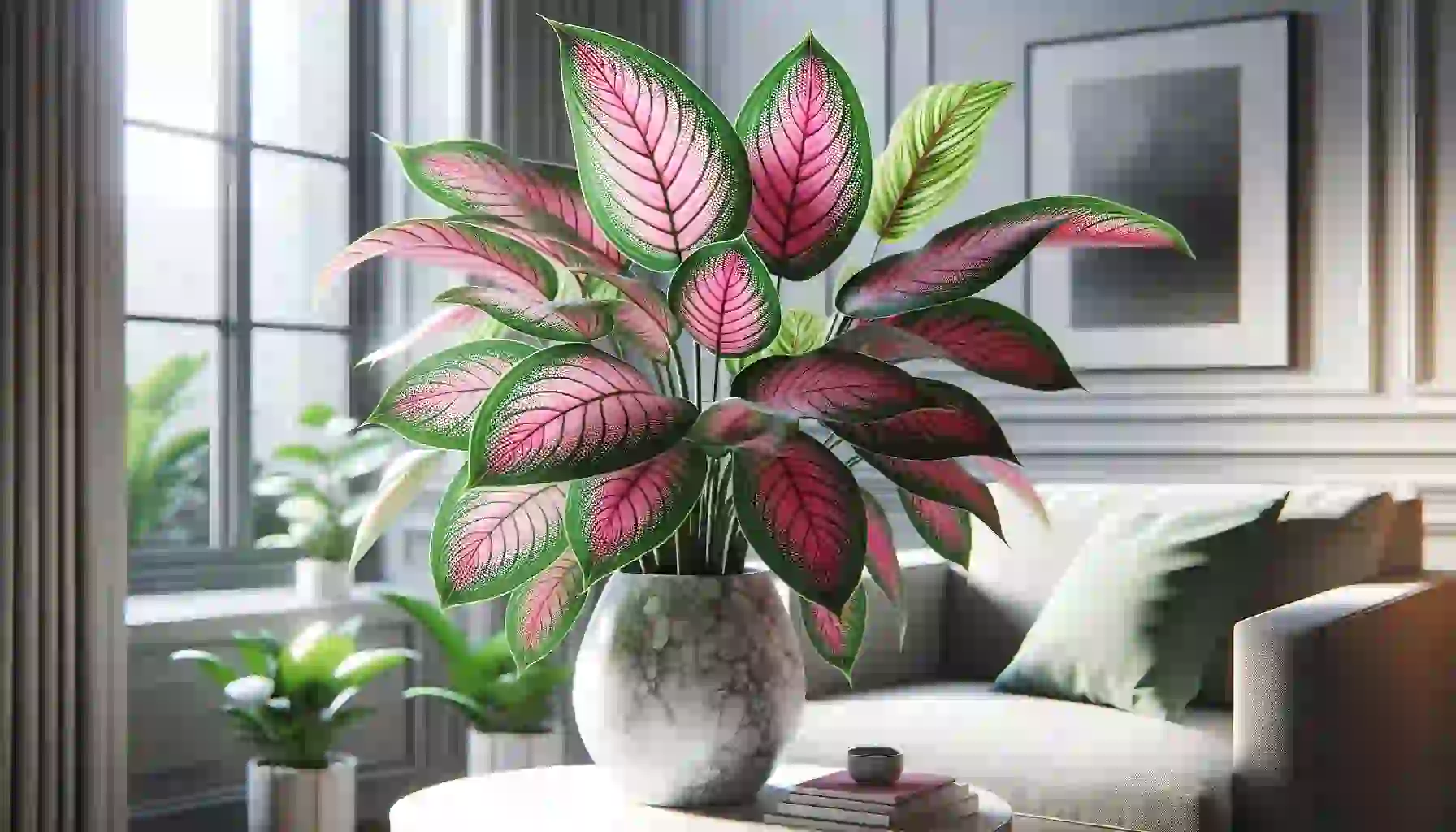Brightonia Guirlande is a sought-after ornamental plant prized for its unique bi-colored foliage.
Arching green stems extend upwards of three feet when mature, draping gracefully under the weight of the leaves. Emerging from every node are delicate leaves with telltale watercolor-like patterns.
The leaves begin as a lime green at the stem then ombré into dusky pink towards the serrated edges, creating a lovely contrast.
The pink seems to climb and bloom like a rose across the leaves as they mature, eventually fading to an antique hue before falling in an evergreen replenishment of the newest growth.
When the trailing stems catch the sunlight pouring into a bright solarium or greenhouse, the glossy leaves glimmer with iridescence, reflecting tints of orchid and tourmaline in a mesmerizing herringbone display.
Though eye-catching enough on its own, the Guirlande makes for a perfect basket plant or centerpiece, ringed by soft white blooms on the occasion it is coaxed to flower by conditions of optimal warmth and humidity.
With attractive foliage year-round and colorful braided stems, the Brightonia Guirlande brings charm to its surroundings all season long.
The Allure of Pink and Green Leaves
Pink and Green Leaves: A Perfect Blend of Colors
The unique combination of pink and green hues in the leaves of these plants is truly captivating.
The pink pigments, usually anthocyanins, contrast beautifully with the lush green backdrop, creating an eye-catching spectacle that can instantly elevate any indoor space.
Adding A Splash of Color to Your Decor
Indoor plants with pink and green leaves effortlessly inject a burst of color into your living space.
Whether you place them in your living room, bedroom, or office, these plants become an instant focal point, turning an ordinary corner into a visual delight.
Popular Varieties
Caladium “Candyland”: Elegance Redefined
Caladium “Candyland” is a stunning variety known for its heart-shaped leaves. The leaves boast intricate patterns of pink veins against a green background, resembling delicate brush strokes.
This plant thrives in bright, indirect light and moderate humidity.
Fittonia “Pink Angel”: Nature’s Mosaic
Fittonia, also called the “Pink Angel,” showcases leaves resembling a beautiful mosaic of pink and green. Its compact size makes it an ideal choice for terrariums or small spaces.
It prefers well-draining soil and consistent moisture.
Coleus “Watermelon”: A Colorful Kaleidoscope
The Coleus “Watermelon” features leaves that resemble a painter’s palette.
With shades ranging from deep pink to light green, this plant adds a kaleidoscope of colors to your indoor garden.
It grows well in partial shade and requires regular pruning to maintain its vibrant appearance.
Caring for Your Pink and Green Leafy Companions

Choosing the Right Location
Place your pink and green leaved plants in a location with bright, indirect sunlight. Try not to open them to unforgiving, direct daylight as it can sear the leaves.
Watering with Care
These plants appreciate consistent moisture, but overwatering can lead to root rot. Allow the top inch of soil to dry out before watering again. Use well-draining pots and potting mix.
Maintaining Humidity
Pink and green leafed plants often thrive in higher humidity levels. You can use a humidity tray or regularly mist the leaves to provide the necessary moisture.
Pruning for Growth
Regularly prune your plants to encourage bushier growth and maintain their vibrant colors. Pinching off spent leaves and leggy stems will promote new growth.
Fertilizing Routine
Feed your plants with a balanced liquid fertilizer every 4-6 weeks during the growing season (spring and summer). This will ensure they receive the nutrients they need to flourish.
Benefits Beyond Aesthetics
Improving Indoor Air Quality
Pink and green leaved plants, like other indoor plants, contribute to cleaner air by absorbing toxins and releasing oxygen. They can help alleviate symptoms like headaches and fatigue.
Boosting Mood and Productivity
The presence of vibrant plants indoors has been linked to improved mood and increased productivity. Their visual appeal can have a positive impact on mental well-being.
Conclusion
Indoor plants with pink and green leaves are more than just decor; they’re living works of art that bring joy, color, and nature into your living spaces.
With their captivating appearance and numerous benefits, these plants are a fantastic choice for both novice and experienced plant enthusiasts.
FAQs
Are pink and green leafed plants suitable for beginners?
Absolutely! Many varieties are easy to care for and can thrive even with minimal plant care experience.
Can these plants tolerate low light conditions?
While they prefer bright, indirect light, some varieties can tolerate lower light conditions. Just be prepared for potentially slower growth.
How often should I fertilize my pink and green leafed plants?
During the growing season (spring and summer), fertilize every 4-6 weeks. Reduce or cease fertilization during the dormant season.
What if my plant’s pink color fades?
Fading pink color could indicate insufficient light or nutrient deficiency. Adjust the lighting and consider fertilizing as needed.
Can I propagate these plants?
Yes, many of these plants can be propagated through stem cuttings in water or soil. It’s a fun way to expand your indoor garden!
I am a Horticulture graduate and passionate gardener with expertise in identifying, growing, and caring for plants, trees, and seeds. With a focus on sustainable practices, they aim to promote environmental awareness and appreciation for the natural world.








